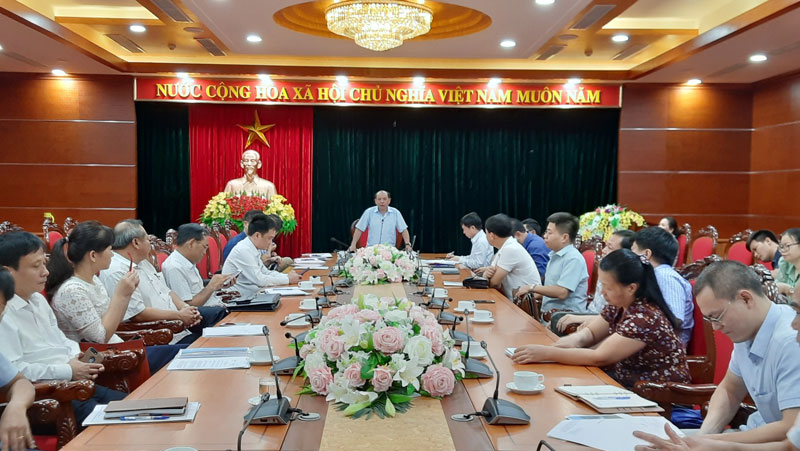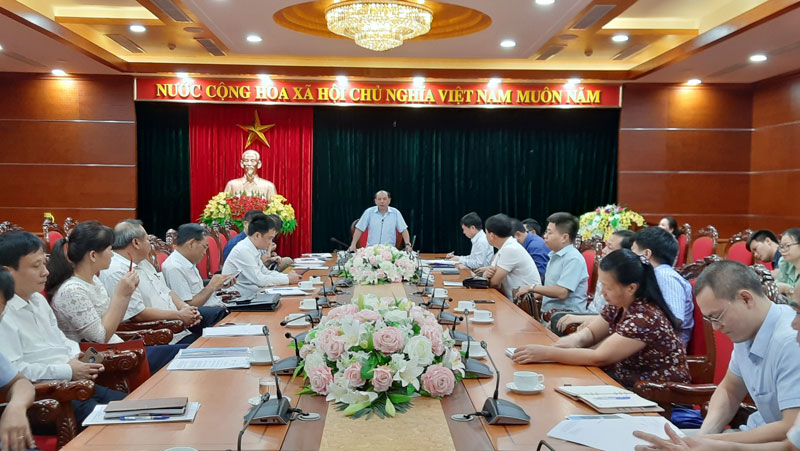
(HBO) – The People’s Committee of Hoa Binh has held a meeting of the organisation board of the Tay Bac (Northwest) Industrial-Agricultural Products Fair 2020 in Hoa Binh. The event was chaired by Vice Chairman of the committee and head of the board Bui Duc Hinh.
 Vice Chairman of the
provincial People’s Committee Bui Duc Hinh chairs the meeting.
Vice Chairman of the
provincial People’s Committee Bui Duc Hinh chairs the meeting.
The fair is slated for October 5-11 at the provincial centre
for exhibitions and fairs in the Hoa Binh Square with 250 pavilions. It will be
held at a cost of over 1.8 billion VND. The event aims to introduce the development of the industry
and trade sector, especially industrial, handicraft and agricultural products
of Northwestern localities.
The fair is expected to create a chance for businesses from
localities nationwide to meet and exchange experience, promoting trademarks,
products, services and technologies, thus enhancing the quality of their
products and expanding the market amidst the country’s strong international
integration.
Economic achievements of Hoa Binh over the years will be
introduced, especially in the area of industry and handicraft. The event will
also be a shopping and entertainment opportunity for visitors, while contributing
to promoting the campaign of "Vietnamese people use Vietnamese goods”.
At the meeting, participants discussed the conditions for
the successful organisation of the fair, including financial resources, time,
infrastructure, solutions to prevent the spreading of COVID-19 pandemic, as
well as the invitation and encouragement of businesses and agencies to join the
fair.
Concluding the meeting, Bui Duc Hinh, Vice Chairman of the
provincial People’s Committee asked relevant departments and sectors to coordinate
with the provincial Department of Industry and Trade as well as the fair organisers
to make preparations for the event and ensure its safety and pandemic
prevention measures.
It is necessary to review specific tasks as well as
financial resources for the organisation of the fair, thus attracting people
and businesses and introducing the potential, strengths, typical products and
socio-economic achievements of the province, he said./.
According to data from the Hoa Binh Provincial Party Committee, the industrial production index for the first six months of 2025 is estimated to have increased by 20% compared to the same period last year. This marks the highest year-on-year growth rate for this period since 2020.
In the first six months of 2025, Hoa Binh province’s export turnover was estimated at 1.145 billion USD, marking an 18.11% increase compared to the same period in 2024. Import turnover was estimated at $ 804 million, a 17.15% increase, which helped the province maintain a positive trade balance.
The lives of the ethnic minority farmers in Tan Lac district have gradually improved thanks to the new directions in agricultural production. This is a testament to the collective strength fostered through the professional associations and groups implemented by various levels of the district’s Farmers’ Union.
With the motto the "product quality comes first,” after nearly one year of establishment and operation, Muong village’s Clean Food Agricultural and Commercial Cooperative, located in Cau Hamlet, Hung Son Commune (Kim Boi district), has launched reputable, high-quality agricultural products to the market that are well-received by consumers. The products such as Muong village’s pork sausage, salt-cured chicken, and salt-cured pork hocks have gradually carved out a place in the market and they are on the path to obtaining the OCOP certification.
In the past, the phrase "bumper harvest, rock-bottom prices" was a familiar refrain for Vietnamese farmers engaged in fragmented, small-scale agriculture. But today, a new spirit is emerging across rural areas of Hoa Binh province - one of collaboration, organisation, and collective economic models that provide a stable foundation for production.
Maintaining growing area codes and packing facility codes in accordance with regulations is a mandatory requirement for agricultural products to be eligible for export. Recently, the Department of Agriculture and Environment of Hoa Binh province has intensified technical supervision of designated farming areas and packing facilities to safeguard the "green passport" that enables its products to access international markets.



 Vice Chairman of the
provincial People’s Committee Bui Duc Hinh chairs the meeting.
Vice Chairman of the
provincial People’s Committee Bui Duc Hinh chairs the meeting.